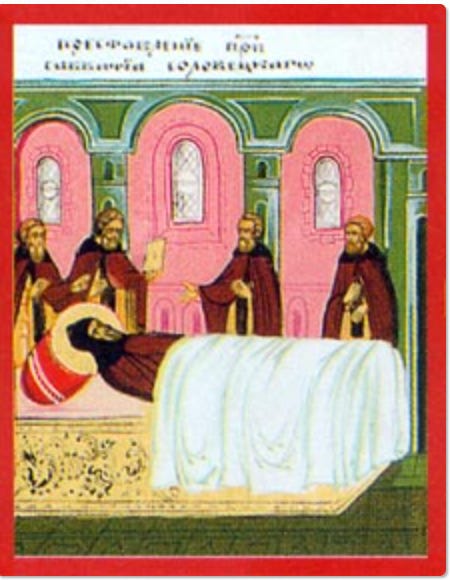“God abides in each commandment by His gracious power. "God is hidden in His commandments", says St. Mark the Ascetic. God helps everyone who strives to keep His commandments. That God abides in us we know by the Spirit, which He has given us. This means that a Christian is never alone, but that he lives and works together with the Thrice Holy God.”
+ St. Justin Popovich, Explanation of I John, 3:24
Daily Scripture Reading
Galatians 2:6-10 (Epistle)
6 But from those who seemed to be something – whatever they were, it makes no difference to me; God shows personal favoritism to no man – for those who seemed to be something added nothing to me.
7 But on the contrary, when they saw that the gospel for the uncircumcised had been committed to me, as the gospel for the circumcised was to Peter
8 (for He who worked effectively in Peter for the apostleship to the circumcised also worked effectively in me toward the Gentiles),
9 and when James, Cephas, and John, who seemed to be pillars, perceived the grace that had been given to me, they gave me and Barnabas the right hand of fellowship, that we should go to the Gentiles and they to the circumcised.
10 They desired only that we should remember the poor, the very thing which I also was eager to do.
Luke 6:17-23 (Gospel)
17 And He came down with them and stood on a level place with a crowd of His disciples and a great multitude of people from all Judea and Jerusalem, and from the seacoast of Tyre and Sidon, who came to hear Him and be healed of their diseases,
18 as well as those who were tormented with unclean spirits. And they were healed.
19 And the whole multitude sought to touch Him, for power went out from Him and healed them all.
20 Then He lifted up His eyes toward His disciples, and said: “Blessed are you poor, for yours is the kingdom of God.
21 Blessed are you who hunger now, for you shall be filled. Blessed are you who weep now, for you shall laugh.
22 Blessed are you when men hate you, and when they exclude you, and revile you, and cast out your name as evil, for the Son of Man’s sake.
23 Rejoice in that day and leap for joy! For indeed your reward is great in heaven, for in like manner their fathers did to the prophets.
Wonderworker of Solovétsky Monastery (1435)
Saint Sabbatius of Solovki came to the Saint Cyril of White Lake monastery in the year 1396, where he received the monastic tonsure. He there pursued asceticism for a long time, unquestioningly fulfilling all obediences. His humility, gentle love towards the brethren and his strict life distinguished the monk Sabbatius among his fellow ascetics. He soon became burdened by the attention and esteem of the brethren and laity coming to him, and having learned that on Lake Ladoga is the rocky island of Valaam, he decided to settle there.
The brethren of the Saint Cyril of White Lake monastery were very sad to be parted from their Elder. At Valaam the worldly fame also began to disquiet the humble Elder. Then the monk learned that in the north was the uninhabited island of Solovki, and he began to ask the igumen’s blessing to settle there in solitude. But the igumen and the brethren did not want to be separated from their holy Elder.
At the command of God Saint Sabbatius left the Valaam monastery by night and set off to the shores of the White Sea. When he learned from the local people that the island was two days distant, that on it were many lakes and that no one lived on the island, he was even more eager to settle there. The astonished local people asked the ascetic, whitened with grey hair, how he would live there and what he would eat. “My Master,” replied the monk, “gives the fresh strength of youth to the frail, and nourishes the hungry to satiety.”
For a certain time Saint Sabbatius remained at the chapel near the mouth of the Vyg River, in the environs of Soroka. There he encountered Saint Germanus pursuing asceticism as a hermit, and together they decided to settle upon the island. In a frail boat, praying to God, the Elders set off upon the harsh sea and after three days they reached Solovki Island.
Symposium: ‘Entangled Jewish and Christian Perspectives on the Encounter with God’
Saint Vladimir’s Orthodox Theological Seminary (SVOTS) will hold its Third Annual Academic Symposium on November 13-15, 2024.
This year’s symposium, titled “I Saw the Lord (Isa 6.1): Entangled Jewish and Christian Perspectives on the Encounter with God,” gathers leading Orthodox Christian and Jewish scholars from around the world, who will reflect on the manner in which theophanic texts—biblical accounts of Divine Revelation to the patriarchs and prophets—have always been and remain foundational to their respective doctrinal and spiritual traditions. For more details, see the Vision Statement.
The symposium will commence on Wednesday, November 13, at 6 p.m. (EST), in the Metropolitan Philip Auditorium, with two keynote addresses.
His Eminence, Archbishop Alexander Golitzin (Emeritus Professor, Marquette University):
“THEOPHANEIA: Studying Orthodox Theology with an Eye to Judaism?”
Rabbi Reuven R. Kimelman (Professor of Classical Judaica, Brandeis University):
“How Do We Image an Imageless God?”
The keynote addresses are open to the public and will be published on the SVOTS YouTube channel after the conclusion of the event.
REGISTER to attend the keynote addresses (in person or online).
CLICK HERE for more information on the Academic Symposium.
This week’s calendar reminders:
Monday 9/23: Matins 8:30 a.m.
Tuesday 9/24: no services or events
Wednesday 9/25: no services or events
Thursday 9/26: Matins 8:30 a.m.
Friday 9/27: Matins 8:30 a.m.
Saturday 9/28: Catechumen Class 4:30 pm; Panikhida 5:45 pm; Great Vespers 6 pm
Sunday 9/29: Divine Liturgy 9: 15 a.m.











